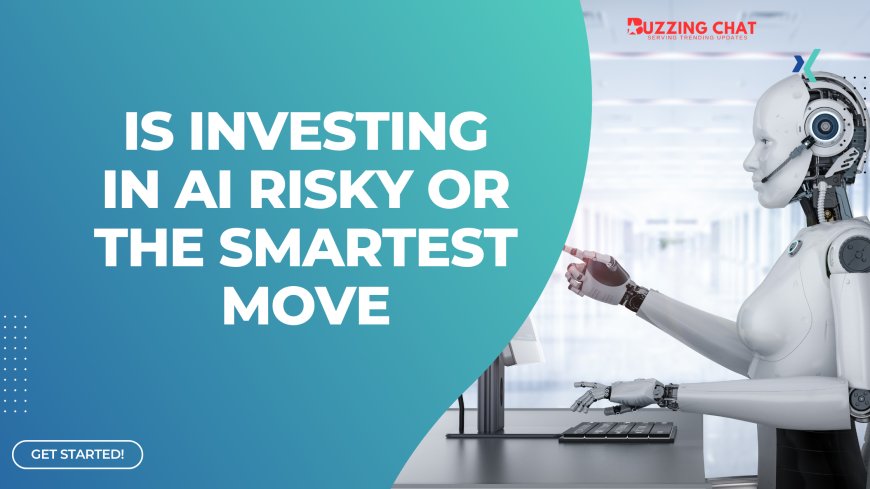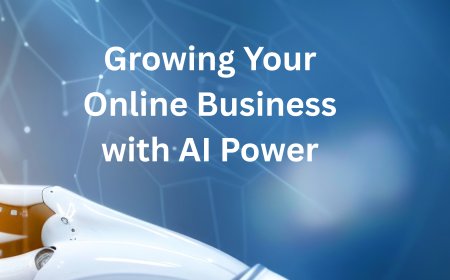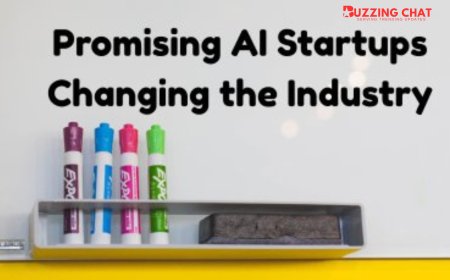Is Investing in AI is a Smart or Risky Move for Firms?
Discover why companies are investing in AI, the potential rewards, and the key risks involved before deciding if it’s the right move for your business.

Introduction to AI
We have stepped into a generation where, frankly speaking, AI has taken over the world. It has drastically changed the world across almost every sector, from finance to education and transportation to entertainment. It has improved efficiency, accuracy, and accessibility in ways it was considered impossible. The ai mode has been activated in areas where people couldn’t even think that it was possible. Artificial Intelligence (AI) will continue to spark changes in how we work and live in this new, developing world powered by modern tech.
Following the release of ChatGPT, artificial intelligence must consider the value of capital and business ventures globally. The high-tech industries are starting to develop the frameworks and procedures necessary to harness AI’s potential for significant benefit. An increasingly important component of those initiatives is investing in AI
WHY ARE COMPANIES INVESTING IN ARTIFICIAL INTELLIGENCE?
In today’s work mentality, people are asking themselves why they should start investing in AI, which is true because of the advanced availability it has given people in order to make their workforce easier. The high-tech industries have given themselves the opportunity for AI mode to present a unique way to invest in cutting-edge solutions designed to address real-world challenges. This is an opportunity for investors to support businesses at the vanguard of revolutionary changes and maybe reap enormous benefits. People think it’s easy for anyone to follow and make AI investments in the realm of modern tech.
The ai mode is now the newest widget for high-tech industries to start investing in AI. Due to FOMO (fear of missing out), many investors may spend as much money as they can, and competing tech companies may decide not to be left behind, so they’ve been jumping on the bandwagon as well. Investing in AI is motivated by both competitive urgency and innovation.
TYPES OF AI STARTUPS TO INVEST IN
Investing in AI has become one of the most crucial choices for both individual and institutional investors in the transforming digital economy of today. More high-tech businesses are using AI to revolutionize operations, customer service, data analysis, and other areas as AI companies continue to upend established models. If you want to make long-term investments in the area of modern tech, here are some of the most promising categories of AI businesses to investigate
AI platforms are drastically upgrading. To stay more updated, check buzzingChat
Healthcare AI Startups
Healthcare startups remain one of the most impacted industries by AI innovation. Robotic surgery, customized medicine, drug research, and ai mode solutions are the main areas of concentration for startups in this field. Investing in AI in this field not only yields financial gains but also helps create inventions that could save lives. As the need for effective medical technology keeps increasing, these are excellent prospects for long-term investments supported by modern tech.
AI IN FINANCE AND FINTECH
AI-powered financial technology businesses provide advancements in credit scoring, algorithmic trading, robo-advisors, and fraud detection. With AI-enhanced systems that analyze huge data in real time, these high-tech industries are flourishing
· Why invest: Fintech is one of the fastest-growing industries, and via scalability and automation, investing in AI in this field can generate significant returns. Investing in AI is motivated by both urgency and innovation
· The way people deal with their money and financial institutions is changing as a result of AI investments in FinTech, an essential component of the larger modern tech ecosystem.
AI IN CYBERSECURITY
AI-powered security is becoming increasingly important as cybersecurity threats get more complex. Significant AI investments are being made in startups that provide behavioral biometrics, AI firewalls, and autonomous threat detection.
· Why it matters: In all high-tech industries, data protection is of utmost importance.
· Putting money into ai investment guarantees not only security but also the opportunity to contribute to the next phase of cyber defense. Safer digital ecosystems are supported by Investing in AI.
AI FOR E-COMMERCE AND MARKETING AUTOMATION
E-commerce is being revolutionized by AI-powered customization engines, recommendation algorithms, and customer support bots. There is a great demand for startups that provide ai mode technologies to increase user engagement and conversion rates.
· For brands looking to prosper in the digital era, artificial intelligence companies in marketing technology are essential.
· These industries are appealing for long-term investments since they frequently draw in returning customers. Investing in AI for marketing automation is more than just a fad; it contributes to quantifiable return on investment and is supported by the constant evolution of modern tech.
RISKS AND CHALLENGES OF INVESTING IN AI STARTUPS
As the world transitions to automation, data-driven decision-making, and intelligent systems, investing in AI has become more alluring. AI startups face significant risks and difficulties, despite the enormous potential that these companies offer to bring to high-tech industries. Prior to making any long-term investments in this industry, it is vital to comprehend these hazards.
HIGH CAPITAL REQUIREMENTS AND UNCERTAIN RETURNS
For research, development, and data infrastructure, many AI industries want a sizable initial investment. The road to financial success is frequently convoluted and lengthy
· If a firm doesn’t scale, some AI investments might never pay off
· AI startups, in contrast to established businesses, frequently deal with cutting-edge, unexpected current technology.
· Early AI investments can be dangerous because of the rapidly changing technology and hazy business models.
DATA DEPENDENCY AND QUALITY LOSS
Large, high-quality datasets are crucial to AI. Startups may find it difficult to successfully train their models if they do not have access to trustworthy data.
· This problem is particularly acute in high-tech companies where precise, real-time data is essential
· Due to this data dependency, AI investments are susceptible to privacy rules and data access difficulties; many AI businesses encounter ethical and legal obstacles while collecting data, which impacts model performance.
REGULATORY AND ETHICAL CHALLENGES
Regulations become more stringent as AI affects delicate sectors, including healthcare, finance, and security.
Laws pertaining to AI ethics, accountability, and transparency are being introduced by governments in a variety of businesses. Startups risk losing the trust of investors if they don’t comply
TALENT SHORTAGE AND HIGH BURN RATES
Many of the highly qualified engineers, data scientists, and researchers needed for AI development are in limited supply.
· Artificial intelligence companies frequently face off against tech giants for talent, which drives up payroll costs.
· This lowers the startup's financial runway by contributing to high burn rates
· This might be concerning for investors, particularly those looking to make long-term investments.
It’s getting more difficult to distinguish out as more firms enter the AI market.
A lot of businesses provide comparable services, particularly in crowded markets like analytics and customer support. Because of this, determining which AI method or product actually offers a competitive edge is challenging uncertainty as distinction makes investments in AI more speculative.
CONCLUSION
Investing in AI is no longer merely a futuristic concept in the rapidly changing digital world; it is now a vital tactic for a variety of companies. AI in everyday life to make things easier. Artificial intelligence companies are changing how we tackle complicated problems and enhance lives in a variety of ways, from redefining healthcare and banking to bolstering cybersecurity and reinventing e-commerce. But risk accompanies potential. Before making long-term investments, one must carefully consider the difficulties of high capital requirements, regulatory barriers, and talent shortages.
However, AI’s potential is found in its scalability and adaptability. Given how quickly modern technology is developing, AI investments can yield substantial profits for those who see its potential and manage its risks. Forward-thinking investors have the opportunity to participate in this revolutionary shift as high-tech industries adopt the AI mode. In the end, AI investments involve placing a wager on creativity, adaptability, and the development of intelligent technology.
Start your journey into the future by staying updated with the technology trends on BuzzingChat.
What's Your Reaction?
 Like
0
Like
0
 Dislike
0
Dislike
0
 Love
0
Love
0
 Funny
0
Funny
0
 Angry
0
Angry
0
 Sad
0
Sad
0
 Wow
0
Wow
0







































